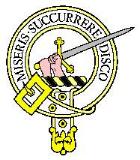
|
|
|

|
|
The following explanation of this latin phrase is an excerpt from the book, The MacMillan Endeavour, The Story of the Clan, by Christopher W. McMullen: The motto...is a quotation from the Latin poet, Virgil: "Miseris Succurrere Disco," which can be translated as "I learn (or endeavour) to succour the distressed." or, more simply, "I learn to help those in need." Somerled MacMillan notes in The Clan MacMillan Magazine (Vol. II, 1958) that this motto "reflects the high-souled chivalry of the Knapdale Dunmore chiefs, as they most certainly strove hard to uphold lofty ideals and noble sentiments." The antiquity of the motto's association with the MacMillans is unclear, though we do know that it was in common enough use at the end of the 17th century for the Reverend John MacMillan of Balmaghie (actually from the Galloway branch of the clan) to have it inscribed upon his personal ring. It is certainly true to the scholarly spirituality of our progenitor. In the epic Aenid, Virgil (70-19 B.C.) depicts Dido receiving the protaganist with the words "Non ignara mali, miseris succerrere disco," meaning, "Not myself being unacquainted with difficulty, I learn to succour the distressed." The french philosopher Jean Jacques Rousseau commented, "I know no line so beautiful, so profound, so touching, so true" (Emile ou l'Education, 1762) Were these the words that crossed the mind of Maolmuire, chief of a twice-evicted clan, when he welcomed Robert the Bruce into his Ben Lawers home? They certainly seem appropriate to this and countless other examples of MacMillan service to the suffering and the oppressed. They cannot be surpassed as an ideal for the progeny of a spiritual missionary to a threatened race. Dr. Hugh MacMillan (The Clan MacMillan, p. 55) wrote: Many of the mottos of the other clans are relics of a time of war and lawlessness, and indicate the fierce moods and manners of the period. But the motto of our clan is full of the finest essence of humanity... It is worthy of the supposed origin of our clan name, as that of a sacerdotal race who devoted themselves in the name of religion and in times of great national distress to the relief of human wants and sufferings. It does not boast of its ability or willingness to succour the distressed, but humbly speaks of its learning to do so by experience. The modesty of the great two-handed sword, as it should always and only be used, for the deliverance of the oppressed and the relief of suffering. "There is little else that could so honour us, who belong to the Clan MacMillan." |
| [Home] |